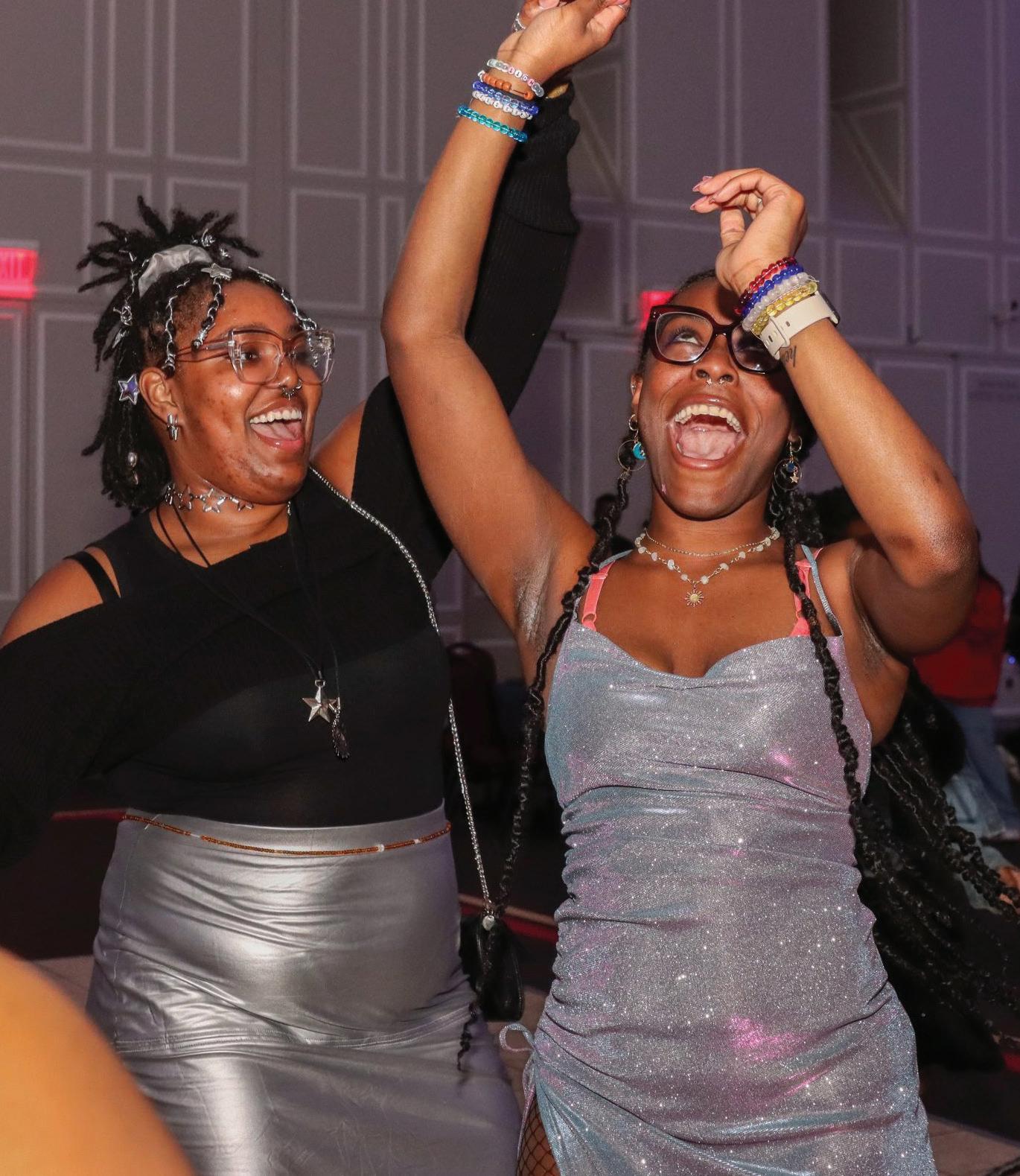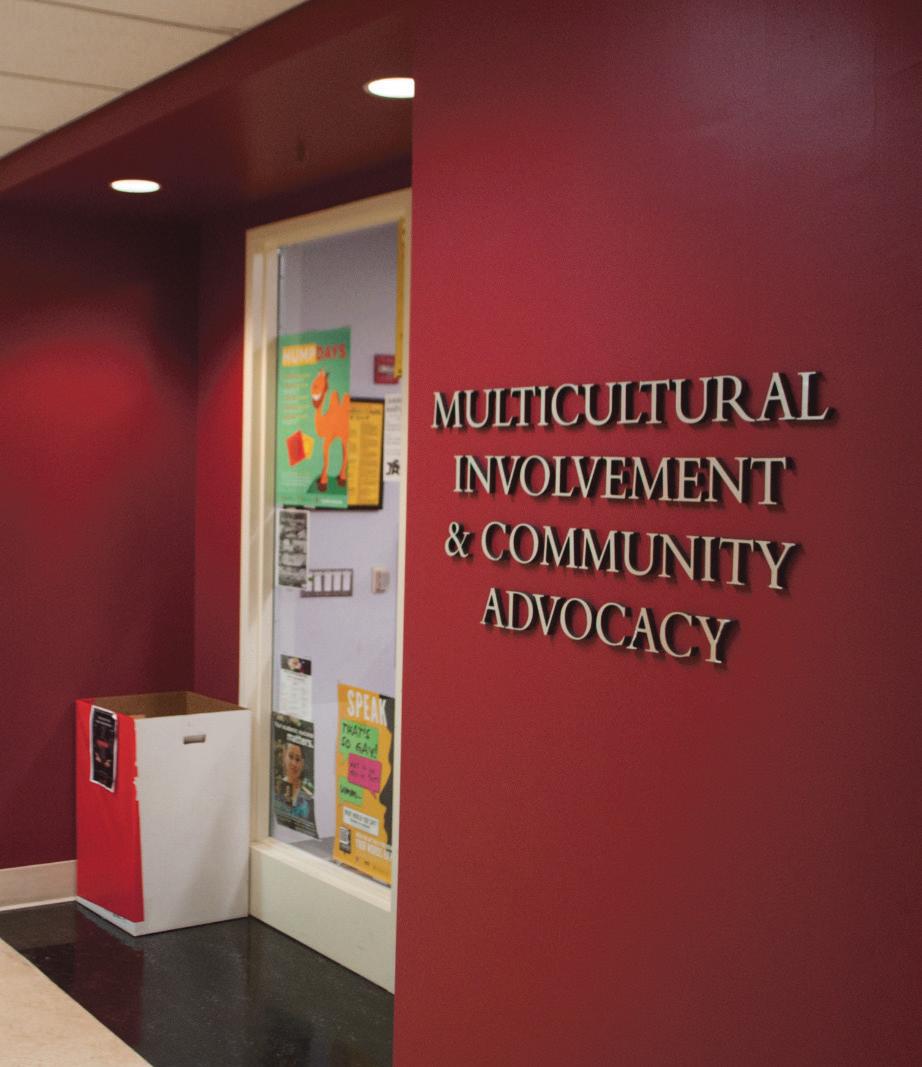The University of Maryland’s Independent Student Newspaper
THE DIAMONDBACK celebrating black culture

2024
3 Cameroonian bags
6 MICa black prom
5 Afrochique showcase
Founded 1910, independent since 1971.
HANNAHZIEGLER Editor in chief
3150 S. Campus Dining Hall, College Park, Md., 20742 (301) 314-8200 https://dbknews.com/contact-us/
FULLY UPDATED AND EDITED BY: Nur Yavuz
ADVERTISING: ads@dbknews.com (301) 276-5770
ORIGINAL TEXT BY:
Tolu Talabi
Sofia Appolonio Natalie Weger
7
COPY EDITED BY:
Hannah Ziegler
Apurva Mahajan Lizzy Alspach Matt Germack
Olivia Borgula
THE DIAMONDBACK:
Job openings: https://dbknews.com/jobs/ Newsletter: https://ter.ps/DBKNL
DESIGNED BY:
Sydney Theis Rebecca Safra
PHOTO EDITING BY:
Autumn Hengen
Giuseppe LoPiccolo
FRONT COVER PHOTO BY: Sam Cohen
BACK COVER PHOTO BY:
FIND US ON SOCIAL MEDIA:





Elliot Scarangello @thedbk @thedbk @dbkonline the diamondback

UMD student creates bag business to highlight Cameroonian culture
While on a visit to Cameroon, Astrid Tagne noticed the intricate design of a family friend’s bag mid-conversation.
The bag spurred a series of questions from Tagne — where was it purchased, and where could she find it?
“It was beat up, but in the most perfect condition,” Tagne, a sophomore information science major, said. “The more I talked to him about it, the more I was like, ‘Wait. This is it. I can do something with this.’”
The conversation led Tagne to create Cordeaux A, a bag business that pays homage to her Cameroonian culture. Cameroonian artisans craft the bags with faux leather and a type of palm tree fiber.
Although she always dreamed of starting a business, Tagne never considered selling bags until the opportunity presented itself. It provided a chance to showcase Cameroonian creativity and craft handmade goods from her native land that are available
By Tolu Talabi I AudioReporterto the diaspora, Tagne said.
The first bag in the Cordeaux A line was the Cordeaux A Original, which Tagne created in collaboration with a designer she met in Ebolowa, Cameroon, through a family friend — the very same designer who had created the bag that originally caught Tagne’s eye.
From WhatsApp voice calls to video calls and voice memos, Tagne checks on the bag-making process regularly from the University of Maryland’s campus. She often gives her designer and his apprentices creative freedom to drive authenticity and innovation, but Tagne said she wants to be more involved in the design process in the future.
“The bags are not just a reflection of me,” Tagne said. “It is also a reflection of the people who are designing and making the handbags.”
Tagne’s first bag was originally designed with just the letter “A” stamped on the banana leaf-shaped leather bag. The letter represented the initial of



Tagne’s name and served as a sample for what she first envisioned as a customizable bag company for loved ones. But Tagne soon learned it was unsustainable to have bags customizable, and created the Cordeaux A brand with an additional “C” to the bag’s design.
The brand’s original bag can be worn as a backpack or cross-body bag, according to Tagne.
Tagne also designed bags with inspiration from Bamileke drums, which hail from a Cameroonian tribe.Bags come in a variety of colors and prints, and some have a brown Cameroonian fruit attached to their strings.
To make a bag, Merlin Silatcha, Tagne’s designer, said he obtains materials from a market in Douala, Cameroon. Some materials also come from Nigeria, he said. After that, he shapes the bag to its desired form and sketches the design that will appear on it. This is later transferred to the actual bag fabric. Then, he glues the pieces together and finishes with stitching.
Bag making is a “dying art” because of a lack of interest in locally-sourced goods, according to Silatcha.He hopes he can gain credibility for what he does and encourage other Cameroonians to make a living from this craft.
“It is difficult for people to accept that I am the person making the bags,” Silatcha told The Diamondback through a translator. “People have to see me making the bags to believe I am the one with this talent.”
Tagne markets her products on Mercari and at pop-up events for small businesses on this university’s campus. Tagne previously sold her bags at Terp Marketplace, an event for small business owners at this university. She is also a part of Dare to Dream, a nonprofit organization that caters to minority businesses on this university’s campus.
Abby Oseguera, a sophomore bioengineering major and Tagne’s friend, bought one of Tagne’s original designs with the letter “A” sewn on in leather. This iteration of the product is no longer available for purchase, but Oseguera was attracted to the bag because the letter “A” matched her name, and she believed that the bags represented Tagne’s affection for her cultural heritage.
“She is an exemplary business owner,” Oseguera said. “Her vibe, her spirit, her energy really radiates through all of her products.”






African culture, dancers shine in Afrochique’s first high school showcase
By Sofia Appolonio I Diversions EditorAs the 20th anniversary of Afrochique — a club supporting women interested in learning and performing African dance — approached, incoming executive board members envisioned how they could celebrate their predecessors while expanding the club’s lasting legacy.
The club previously competed in local dance competitions with fellow University of Maryland African dance team Diazporić. Afrochique’s administrative co-president Naahdia Mundi said reflecting on this time inspired the club to bring a similar platform to younger performers.
“We thought that it would be really nice for high schoolers to have that same opportunity to really just show the community their talents and love for their culture,” the senior public health science major said. “Growing up as minorities in predominantly white areas or just areas that didn’t have as much representation for us, we wanted high schoolers to have something to look forward to in regards to African culture.”
This vision came to life Saturday night during Afrochique’s presentation of “The Next-Gen: High School ASA Dance Battles.” Dynamic performances by teams from Howard and Prince George’s county schools ignited Stamp’s Student Union’s Hoff Theater in a celebration of culture, heritage and youth creativity.
Dancers from Eleanor Roosevelt High School, DuVal High School, Largo High School and Reservoir High School combined with Hammond High School competed for a cash prize in four rounds: creative, traditional, tag team freestyle and captain vs. captain.
“This is a new event for us,” said Chelsea Amadi-Emina, who heads the club’s outreach committee.“We’ve never really hosted an event as a team, so we were learning as we were going on about it.”
Amadi-Emina, a senior information science major, added that outreach and promotion for Next Gen was done primarily by Afrochique, and that organizing and focusing on community engagement was a huge learning experience for the group.
Throughout the night, each team demonstrated their musicality, versatility, innovation and stage presence for the packed theater. The groups’ pieces featured multiple genres including globally popular styles such as trench and amapiano.
Ranging from Roosevelt’s AfroSync team smoothly swiping votes as hot pink masked robbers to DuVal High School embodying community members punishing a womanizer for his antics, the creative round allowed full storytelling and genre control for the performers.
Following the creative round, the teams changed into traditional garments to showcase the culture and rhythms of Ghana, Ivory Coast, the Democratic Republic of Congo and Cameroon for the next round’s competition.
Mundi said that following this presentation, she hopes Afrochique can continue to host the event annually and cultivate a love for African culture and dance across Maryland and nationwide.
“Doing the behind the scenes work and checking in on the highschoolers, we can already see that they have been putting in research through this [tradition] round specifically,” Mundi said. “That’s very wholesome knowing that they’re spending time to understand the traditions of other cultures.”
The showcase extended beyond the competition by featuring a myriad of local talent. Next Gen had performances from African DMV musicians like Yungseriki and Meka Luxx as well as dance groups Diazpori, Dem’ Raider Boyz
Step Squad — a nationally recognized all-male step team from Greenbelt— and Afrochique themselves taking the stage to perform. Pop-up food and clothing vendors also served attendees before the show and during intermission.
The anticipation to declare a winner continued to grow, but the high spirits of the room never wavered. Competitors and attendees bounced energy off each other in every performance, filling the room with unbridled school pride and excitement for the competition.
It was this energy that encouraged DuVal High School senior and competitor Vierdonie Toto to push through and excel with her team.
“This is my first competition, so it’s definitely a first time experience and I loved it so much,” Toto said.“It was definitely a lot of work, me and my team, we were stressing out but literally at the end of the show, we really did that.”
The battles grew fierce as the evening progressed, with the final two rounds featuring freestyle performances from selected dancers and their captains. In groups of four, performers had to think fast on their feet to match the genre of a selected song.
After each team’s captains competed in the final round of battles, the room grew quiet as lights dimmed and phone cameras went up. It was time to announce a winner. With bated breath, the room erupted in cheers when DuVal High School was crowned the winners.
Toto, still elated from DuVal’s win, encouraged others to keep pushing towards their goals no matter how hard the work can get.
“We really came a long way and I’m so proud of my team,” Toto said. “I can’t believe that we won, like wow.”

UMD students celebrate Black culture, fashion at prom dance
By Natalie Weger I Staff WriterUniversity of Maryland students danced and belted out in song at the Samuel Riggs IV Alumni Center on Feb. 17 for a celebration of Black culture at the university’s second annual Black Prom.
The prom, hosted by this university’s Multicultural Involvement and Community Advocacy office, was part of this university’s Black History Month festivities to highlight the richness and diversity of Black culture. This year’s Black History Month theme at this university is “Reconnecting AfroFutures,” according to MICA.
“[Afrofuturism] is more than the aesthetic of the blend of futurism and technology,” Micaylah Jones, MICA’s graduate coordinator for Black student involvement and advocacy, said. “[It’s] a lens through which to view the Black community as a part of the future and as agents of creating a future.”
This year’s prom theme was “Alien Superstar.” The theme refers to a song by Beyoncé in her 2022 album, Renaissance, which is considered to be Afrofuturistic, Micaylah Jones said. Prom attendees were encouraged to dress in celestial outfits and display their hair in an Afrofuturist style, according to MICA.
Micaylah Jones emphasized that Black History Month is not only about focusing on oppressive experiences that the Black community has faced throughout history, but also the celebration of Black culture.
“Black history is so much more than, of course, slavery and civil rights and armed resistance,” Micaylah Jones said. “Black history is also about joy and celebration and
love and happiness. We really wanted to create a space that emphasizes that.”
The prom also included a performance from the Prima Dolls, a predominantly Black hip-hop and jazz dance team at this university that performs at cultural events on campus.
Bruktawit Mekonnen, a member of Prima Dolls and a junior dance and information sciences major, said the month should not only be about uplifting Black people, but also recognizing and loving each other.
Andrikka Jones, a graduate journalism student, attended the prom with her mother as the pair wore glistening silver dresses handcrafted by Andrikka Jones’ mother. She added that her favorite parts of Black culture are the different forms of expression, such as music, fashion and hair.
She emphasized that it is important for the community to celebrate Black History Month and honor Black pioneers throughout history. Andrikka Jones said she appreciates how many Black students have successfully graduated from this university, including football players Stefon Diggs and Torrey Smith.
“It’s too short of a month but it’s just us bringing and shining light to our culture and the people who paved the way for us,” Andrikka Jones said. “It’s just a great time to celebrate and really hone in on what our people have brought to society today.”
Some prom attendees, such as sophomore sociology and human development major Trinity Abeng Allsop, went to last year’s inaugural Black prom and hoped to experience

the celebration again.
For Abeng Allsop, Black History Month means expressing her background and culture, she said. She added that it feels “really good” to show her heritage and interact with those who share similar experiences to her.
“Especially for me as a Black woman, I feel robbed and underrepresented,” Abeng Allsop said. “So I will do whatever I can to put my best foot forward and showcase myself in every platform and place that I go to.”
This year, Abeng Allsop said that she has been exploring her fashion sense and experimenting with tribal patterns and 1990s outfits. Like other attendees, Abeng Allsop said fashion is one of her favorite parts of Black culture.
Rachel Odumade, a sophomore public health science major, wore a silver sequined dress to the dance. She also added a coat of silver makeup around her eyes to replicate a viral tape trend that she had seen on TikTok.
Odumade said she appreciates how Black culture often influences fashion and trends in mainstream media. Taking pride in Black culture is a crucial part of Black History Month, she added.
“Black History Month, to me, means to celebrate Black people and just acknowledge all the things in the past that brought us here today to even do simple things that I feel like many people take for granted,” Odumade said. “People should just celebrate themselves [and] just be unapologetically them in their Black skin.”

‘Elevated Apparel’ founder pursues art through fashion, photography
When an artist’s mind and boredom meet, it can spark a fashion brand. That was the case for junior immersive media design and information science major Nnenna Elekalachi.
Elekalachi birthed her streetwear brand, Elevated Apparel, in late 2020. She was inspired to pursue the idea after witnessing the success of other small clothing businesses on social media. These businesses often paid people to create their designs, she said, but Elekalachi believed she had an edge over any competitors: she could draw.
An artist since pre-kindergarten, Elekalachi made her first sale after customers made orders from the art they saw in her sketchbook.
The fashion brand also spreads an important message, Elekalachi added.
“Elevated is supposed to stand for positivity and uplifting,” she said. “I’m also a Christian, so I wanted to show that and put a little bit of me and my religion and my ideology on life into clothing.”
One of Elevated Apparel’s T-shirts includes a graphic of a halo and wings, with the numbers 4:13 pasted on the front and the phrase “I am elevated through Christ who strengthens me” on the back of the shirt, alluding to Phillippians 4:13 in the Bible.
Elevated Apparel has also received support from the University of Maryland community. Both administrators and the wider student population
By Tolu Talabi I AudioReporterhave supported Elekalachi at campus pop-ups. She is especially thankful for Black community members on this university’s campus because they often relate to her pieces most.
The creative’s fashion business also brought about another talent she never knew she had: photography. After a failed experience with the professional photographer she had booked for her apparel launch in 2020, she got a camera for herself.
The photo shoot was successful, so much so that she began pursuing photography by taking pictures of students on this university’s campus. Elekalachi would post on her Instagram story and ask if any students were interested in modeling and do free shoots for them. The shoots also served as a portfolio for the start of her photography business called “Elevated FX.”
Jayden Gyamfi, a sophomore operations management and business analytics major, modeled for Elekalachi’s shoot, No Man’s Land, which was inspired by Brent Faiyaz’s Wasteland album cover. Gyamfi was on board with the project immediately because of his enjoyment of Faiyaz’s music.
“What’s unique about Nnenna’s photography businesses is her ability to bring ideas into fruition,” Gyamfi said. “The results of the

photo shoot really made my jaw drop.”
Learning photography wasn’t difficult for Elekalachi because of her history in art, where she learned about composition and color theory, she said.
Her recent photography work, Flower girls, stemmed from one of her drawings, which she felt would be a good concept to replicate live. She collaborated with her friend, Ikechukwu Ihejirika, who is a junior communications major at Towson University.
Ihejirika describes collaborations and creative sessions with Elekalachi as a push and pull, where they constantly bounce off of each other’s creativity and end with “magic.”
“Nnenna sort of has a tunnel vision, so she sees what she wants to create in her mind, and she finds a way to make it happen,” Ihejirika said.


